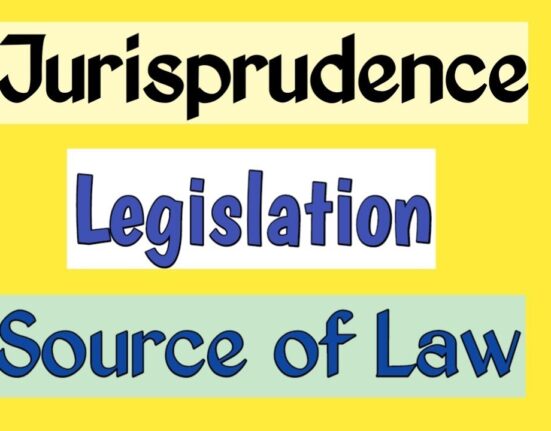Ilma Syed, a 2nd Year LLB student from Chaudhary Charan University, Meerut has written this Article on “Sociological School of jurisprudence”.
Introduction
Sociological School of jurisprudence has emerged as a result of the fusion of various eminent jurist thoughts. The advocator of this school considered law as a social phenomenon. They are mainly concerned with the relationship of law to other social institutions. They insist that jurist should focus their attention on social objectives and interests served by law rather than on individuals and their abstract rights.
The main aim of sociological jurists is to study the effect of law and society on each other. They treat the law as an instrument of social progress. The relation between positive law and ideals of justice also affects the sociology of law.
Many Jurists believed that sociological jurisprudence originated as a reaction to rigid positivism. It was based on the fact that law is solely a coercive power of the State and completely ignored the pursuits of morality and justice. Likewise, it was also opposed to the historical school’s concept of past customs, traditions and values.
Four Developmental Stages of Sociological Jurisprudence
As stated earlier, the approach of jurists towards law in terms of its functions, purpose and objectives experienced a revolutionary change towards the end of the 18th century. The prevailing social order and economic conditions due to the impacts of laissez-faire philosophy generated rift and tensions between different sections of society. It was realised that liberty with equality and freedom without security was at the root of this disorder in society.
Therefore, there was a need for a new approach to the study of law in terms of the pressing needs of society as the preceding dogmatic approach had failed to deliver the goods. This led to the emergence of the sociological jurisprudence. It began from Auguste Compte, was brought to realisation by Dean Roscoe Pound and finally culminated in the realist school of the 20th century.
The major stages through which sociological jurisprudence is involved and developed may briefly be stated as follows-
Empirical Scientific Approach to Law
Auguste Compte (1789-1857) is said to be the founder of sociological jurisprudence who made the beginning of scientific positivism. His approach to the law was empirically based on experience and observation. Thus he rejected metaphysical methods of the study of law which was commonly resorted to by his predecessors belonging to the philosophical and historical school. He denounced hypothetical considerations in the perception of law. He based his study of law or empirical observation in an effort to establish a correlation between law and society. Being a mathematician himself, Comte was greatly influenced by mechanical analogies.
The Impact of Darwinian Evolutionary Theory
The next stage in the development of sociological jurisprudence has been called the ‘biological stage’. It’s because of the influence of The Darwinian’s Evolutionary Theory. Herbert Spencer explained the social phenomenon as a biological process adapting itself to the changing needs of society. He asserted law must evolve and adapt itself to the changing needs of the progressive society. It is through the instrumentality of law that the conflicting interest of the members of society are reconciled. However, various groups are held within their bound in the interest of the society as a whole.
Impact of Psychological Theories
According to Dean Roscoe Pound, the third stage of the development of a sociological school is a psychological stage. It was a period of later half of the 19th century and the first quarter of the 20th century during which psychology had greatly influenced other social science including law.
Ottovon Geirke (1814-1912) denounced the orthodox approach of the historical school which overemphasised the metaphysical approach to law. It highlighted the importance of group personality for securing collective interest. Thus it was realised that the psychological aspect of the law has a close bearing to its functional aspect. George Gellinek (1851-1911) propounded his social psychological theory of sanction. He held that law sets the norms for external conduct for men and it proceeds from an external power.
Unification Stage
The last stage of development of sociological jurisprudence consists of the unification of the sociological method of other social sciences. It was realised that different social sciences represent different aspects of human society. Therefore they are supplementary and complementary to each other. Moreover, such law also cannot be detached from various socio-economic aspects of society. It is an effective means of social control in the society.
Main Exponents of Sociological Jurisprudence
The main exponents of the sociological jurisprudence which has been characterised as interest-oriented, interest loaded and interest directed were Montesquieu, Auguste Compte, Herbert Spencer, Rudolph Ihering, Eugen Ehrlich, Leon Duguit, Francois Jeny, Dean Roscoe Pound etc. In the United States, Justice Oliver Windell Holmes, Benjamin Cardozo.
Montesquieu (1689-1755)
Montesquieu was a French legal thinker who is considered to be the forerunner of the sociological school of jurisprudence. He was the first in point of time to perceive the influence of social conditions on law and legal institutions. In his book “THE SPIRIT OF LAW’, he emphasised that “laws of a particular nation should be determined by its national characteristics and must be a relation to the climate of each country, the equality of each soil, the situation and extent, the principle occupation of the natives and above all, to the religion of inhabitants, to their inclination, riches, commerce, manners and customs”.
Therefore, though not a propounder of sociological jurisprudence, Montesquieu’s name deserves mention as a forerunner of this school of thought.
Auguste Compte (1786-1857)
The noted French legal thinker and philosopher Auguste Compte is regarded as the founding father of the science of sociology. He was the first to employ the term ‘sociology’ to connote an independent discipline. He applied the scientific method to study sociology which has been termed ‘scientific positivism’. According to him, society, like any other organism can progress when it is guided by scientific principles. These principles must be formulated by observation and experiments of facts and all other metaphysical considerations should be excluded from its purview.
He further pointed out that man cannot live in isolation as he is essentially a social being and all his impulses originate from his social life which are to be regulated and controlled by law and the government. Therefore it is the ‘society’ and not the ‘individual’ which should be the focal point of law. The legal theory of Auguste Compte greatly inspired Durkheim and later great sociological jurist Leon Duguit founded his theory of social solidarity taking inspiration from these legal thinkers.
Rudolph Von Ihering (1818-1892)
Ihering was educated in Berlin, Germany. He was the Professor at Basel, Rostock, Keil, Vienna, Strausburg and Gottingen. His monumental work, Spirit of Law was published in 4 volumes during 1852-1865. Later he published his principal work which was translated as ‘Law As Means To An End’ in 1913. In this work, he criticised the notion of individual freedom and liberty as advocated by Kant and Bentham as they had divorced legal theory from social realities. Ihering opined that the social interest of society must gain priority over individual interest and the purpose of law should be to protect the interest of society.
The main tenets’ of Ihering’s jurisprudence of interest:-
- Law is the result of constant struggle- Ihering pointed out that the origin of law is to be found in social struggles. He accepted that the role of law is to harmonize the conflicting interest of individuals for the purpose of protecting the interest of society as a whole.
- Law is to serve a social purpose- Ihering considered law as a means to an end. The ultimate end of law is a social purpose and not an individual purpose. It is the duty of the State to promote social interest by avoiding a clash between the individual and social interest. He even justifies coercion by the State for the purpose of protection of social interest.
- Law alone is not a means to control society- Ihering made it clear that law alone was not the means to control the social organism. There are some conditions such as climate, topography, etc. law need not intervene. There are, however, certain aspects of social life that can be regulated and controlled exclusively by the intervention of law, such as the raising of taxes and revenues. Like Bentham, Ihering also defines ‘interest’ in terms of pleasures and pain, that is, the pursuit of pleasure and avoidance of pain may be called ‘interest’. It is mainly for this reason that Ihering’s theory has been called “social utilitarianism”. He considered punishment as a means to a social end. He is opposed to the retributive penal policy.
Ihering’s Contribution-
- Ihering’s contribution to the science of jurisprudence has been acknowledged by Friedmann who calls him the ‘father of modern sociological jurisprudence’. Ihering traced the development of various legal systems by adopting a comparative method of study and came to the conclusion that law develops through conscious efforts.
- Ihering laid the foundation of modern sociological jurisprudence by this insistence on treating law as one of the important factors to control the social organism. According to him,
- Law has a coercive character
- It has only a relative value
- It has to be evaluated in a social context.
- According to Ihering “the social activities of people are controlled by reward and coercive, duty and love”. For him, laws were the only way to achieve the end, namely, social control. He emphasized that the law was an instrument for serving the needs of man and each individual’s self-interest. He believed that law does not exist for the individual as an end in himself, but serves his interest with the good of society.
Criticism Against Ihering’s Theory-
Ihering’s legal theory has drawn criticism for two reasons: first, it just identifies issues without proposing solutions. He claims that the goal of law is to resolve competing interests, but he makes no recommendations as to how this should be done.
Second, some legal experts have questioned Ihering’s argument by asserting that the law only protects the “will,” not the “purpose.”
However, this argument has not received much attention because, according to Korkunov and many other jurists, the goal of the law is to safeguard “purpose” rather than “will” of society. Ihering attempted to balance conflicting social and personal interests in his theory, which was mostly based on utilitarianism as defined by Jeremy Bentham.
Leon Duguit (1859-1928)
Leon Duguit was a French jurist who made substantial contribution to the sociological jurisprudence in early 20th century. He was a Professor of constitutional law in the University of Bordeaux for many years. During his time individualism was crumbling in Europe giving way to in which state’s role extended to public service. The reflection of collectivist ideologies could be found in the writing of Durkheim, Piaget, Max Weber etc. Duguit was much influenced by Auguste Compte’s theory of law as a fact which denounced individual rights of men and subordinate them to social interest. Compte pleaded that ‘the only right which man can possess is the right always to do his duty’. This formed the basis of Duguit’s legal theory.
Duguit was also influenced by Durkheim’s work ‘Division of Labour in Scoiety’ which was published in 1893. Durkheim made a distinction between two kinds of needs of men in society. Firstly, the common needs of individuals which are satisfied by mutual assistance, and secondly, the diverse needs of individual which are satisfied by exchange of services. Therefore, the division of labour is the most important fact which Duguit called as ‘ social solidarity’.
Doctrine of Social Solidarity-
Duguit’s theory of social solidarity was based on the fact that interdependence of man is the essence of society. Every individual has his existence owing to his membership of the society. Each individual cannot procure the necessities of life by himself. Therefore, each in his turn has to depend on other for his needs. The ultimate end all human activities is to ensure the interdependence of men. Duguit further stated that law also serves the same end.
He pointed out that law is a rule which men obey not by the virtue of any higher principle but because they have to live as members of society. He rejected the traditional notions of rights, sovereign, state, public, and private law, legal personality as fiction and unreal because they were not based on social reality. His entire thrust was on mutual co-operation and mutual interdependence between individuals, groups, and societies according to the principle of division of labour for purpose of social cohesion.
Law to secure and serve Social Solidarity
According to Duguit, the essence pf law is to serve and secure social solidarity which is duty oriented as it expects individual to perform their obligations as a member of community. There is therefore, no scope for natural or private rights. Thus Duguit stated that law consists of duty which is the basis of co-operation and rejects the abstract concept of right which is the source of conflict. In other words, Duguit exhorts every one to perform his duties to the society which would help development of co-operation and social solidarity.
For Duguit , law is not a body of rights. The only real right of man is society is to do his duty. Law is essentially an objective social fact concerned with relation between man and man on the one hand, and man and state on the other.
Theory of Justice
Duguit defines justice in terms of fulfilment of social needs and obligations. According to him, law must seek to promote social solidarity so as to attain maximum good for the society as a whole. State regulations should be directed towards achieving the ends of social and economic justice for common good. He considered ‘justice’ as a social reality its roots being in the society itself not in the sovereign itself.
Criticism against Duguit’s Theory
- The critics of Duguit suggest that his theory of social solidarity suffers from many weaknesses , the first being that it excludes all metaphysical considerations from law and it is itself based on the ideal of natural law.
- Duguit’s definition of law is also confusing as in lying down the fundamentals to which the law must conform. He confuses to distinguish between what the law is and what it ought to be.
Roscoe Pound (1870-1964)
Roscoe Pound was born in Lincoln Nearaska (New Jersey) in 1870. He was an auxiliary Judge of Supreme Court of Nebraska for short period of two years during 1901-1903. Thereafter , he worked as a Dean of the Law school at Nebraska.
Pound’s Contributions to Sociological Jurisprudence
Emphasis On Functional Aspect of Law:
Roscoe Pound added new dimensions to sociological school of jurisprudence. His approach to sociological jurisprudence was different in the sense that he attempted to cover social-life as a whole unlike his predecessors who considered law as the main subject of study and society is merely subsidiary to it. Pound laid greater stress on functional aspect of law. That is why his approach has been termed as ‘functional school’ by some writers.
Elaborating the functional aspect of law, Roscoe Pound stated that the function of law is to reconcile the conflicting of the individuals and community and harmonise their inter-relations. He termed this as ‘social engineering’
Pound’s Theory of Social Engineering:
Roscoe pound conceived law as a ‘social engineering’,. Its main task being to accelerate the process of social ordering by making all possible efforts to avoid conflicts of interest of individuals in the society. Thus, courts, legislators, administrators and jurist must work with a plan. Moreover, make an effort to maintain the balance between competing interest in society. He defined interest as a claim, or want or a demand, of human being or groups of human beings which they seek to satisfy and which the social engineering in civilised society must take into account.
Pound Enumerated various interest which the law should seek to protect and classified them into three broad categories, namly,
- Private interests
- Public interests
- Social interests
Private Interests-
These include –
- Individual’s interest of personality, namely, interest of physical integrity, reputation, freedom of volition and freedom of conscience. They are safeguarded by laws of crime, torts, contract, constitutional law etc.
- The interests of domestic relations of persons such as parent and children, marital life as also the individual’s private interests.
- The interest of subsistence such as property, succession, testamentary disposition, freedom of contractual relations, association etc. are also included in the category of private interests.
Public Interests-
The main public interest according to Roscoe Pound are-
- Interest in the preservation of the State as such; and
- State as a guardian of social interests such as administration of trusts, charitable endowment, protection of natural environment, territorial waters, sea-shores, regulation of public employment and so on.
Social Interests-
The social interest which need legal protection are-
- Interests in the preservation of peace, general health, security of transactions etc.
- Preserving social institution such as religion, political and economic institution etc.
- Interests preserving general morals by prohibiting transactions which are against morality such as prostitution, drunkenness, gambling etc.
- Interests in conservation of social resources, e.g., natural resources, reformation of delinquents, protection of economically weaker sections of the society.
- Social Interest in general progress including economic, political, and cultural progress. For example, freedom of trade and commerce, freedom of speech and expression, encouragement of arts, and promotion of higher education.
- Interest promotes human personality by enabling a person to live political, cultural, social and economic life to suit his taste and improve his personality.
Jural Postulates of Roscoe Pound
In order to evaluate the conflicting interest in due order of priority, Pound suggested that every society has certain basic assumptions upon which its ordering rest, though most of the time they may be implicit rather than expressly formulated. These assumptions may be called jural postulates of the legal system of that society. In 1919, Pound summarised five jural postulates as follows:-
Jural Postulate I-
In a civilized society men must be able to assume that others will commit no intentional aggression upon them.
Jural Postulate II-
In a civilized society men must be able to assume that they may control for beneficial purposes what they have discovered and appropriated their own use what they have created by their own labour and what they have acquired under the existing social and economic order.
Jural Postulate III-
In a civilised society men must be able to assume that those with whom they deal as a member. If the society will act in good faith and hence-
- Will make good reasonable expectation which their promises or other conduct reasonably create;
- Will carry out their undertaking according to the expectation which the moral sentiments of the community attaches thereto;
- Will restore specifically or by equivalent what comes to them by mistake, or failure of the pre-suppositions of a transaction, or other and anticipated situation whereby they receive at other’s expense what they could not reasonably have expected to receive under the actual circumstances.
Jural Postulate IV-
In a civilised society men must be able to assume that those who engage in some course of conduct will act with due care not to caste an unreasonable risk of injury upon others.
Jural Postulate V-
In a civilised society men must be able to assume that others who maintain things or employ agencies, harmless in the sphere of their use but harmful in their normal actions elsewhere, and having a natural tendency to cross the boundaries of their proper use will restrain them and keep them within their proper bounds.
Criticism Against Pound’s Theory-
The main criticism of Pound’s social engineering theory was that it was overly scientific and mechanical; in particular. It’s because Pound used the term “engineers” to refer to lawyers. It implied that since society was the source of law for this school, it was almost like a factory-like mechanism.
Additionally, this theory’s emphasis on interests was criticized on the grounds that it placed too much emphasis on this rather than the association of a man with another man in society. Not to mention, Pound’s omission of a distinction between individual and communal interests led to criticism from many because it gave the theory the appearance of being overly balanced.
Another popular critique of this theory is that it ignores or avoids emphasizing the dynamic nature of law. In contrast to other science areas, making it more problematic when contrasted as such.
Furthermore, the patent law impliedly discussed in the postulates is extremely ambiguously presented and open to abuse. If read literally without any extra context, particularly when it pertains to products or things like medications or vaccinations that have to do with health-related issues.
The last criticism that this theory frequently encounters is that political concepts change frequently with the times. This may very well lead to instability in the legal system. This is especially true when, in Pound’s view, much of the law depends on the implementation of “social engineers” when the State is required to mediate between conflicting interests.
Conclusion
The Sociological School of Jurisprudence investigates how and society are related. It demonstrates how society and the law are intertwined. Without considering and researching the requirements and societal structure, one cannot create better and more effective legislation. We need better and more effective laws for a more harmonious society.
As an illustration, the Nirbhaya Gang Rape in 2012 in Delhi. In India, rape laws are being changed.
In India, every issue has two sides: a legal aspect and a sociological aspect. Like the legal side of female infanticide, which was made illegal by Bengal Regulation XXI in 1795. The British government took action to stop female infanticide and related propaganda. The social side of it is that nature created both sexes to ensure the survival of the human race. The United Nations Population Fund listed gender equality and women’s emancipation as one of the eight Millennium Development Goals in 2001.
August Comte, Eugen Ehrlich, Roscoe Pound, and Duguit are all jurists who belong to the Sociological School of Jurisprudence. According to August Comte, society is an organism that can advance if it is led by scientific principles. While Roscoe Pound equated attorneys to engineers and Eugen Ehrlich claimed that “society is the main source of law,”. It made the case that the goal of the law is to resolve the conflict between the interests of the individual and the state.
Also Read: Schools of Law in Jurisprudence, Click Here!
Reference
- Dr. N. V. Paranjape, ‘Studies In Jurisprudence And Legal Theory’ Eighth Edition
- RWN Dias, ‘Jurisprudence’, Fifth Edition







Leave feedback about this